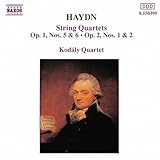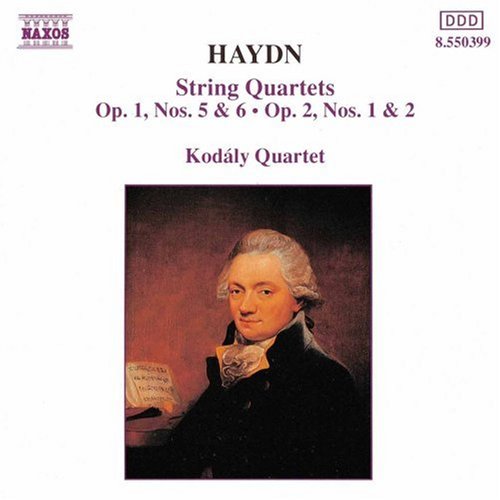Disco de Franz Joseph Haydn: «Haydn: String Quartets Op. 1, Nos. 5 & 6 / Op. 2, Nos. 1 & 2»

- Valoración de usuarios: (4.3 de 5)
- Título:Haydn: String Quartets Op. 1, Nos. 5 & 6 / Op. 2, Nos. 1 & 2
- Fecha de publicación:1994-02-15
- Tipo:Audio CD
- Sello discográfico:Naxos
- UPC:730099539920
- 1Str Qt in E flat Op.1 No.5: Presto
- 2Str Qt in E flat Op.1 No.5: Minuet
- 3Str Qt in E flat Op.1 No.5: Adagio
- 4Str Qt in E flat Op.1 No.5: Minuet
- 5Str Qt in E flat Op.1 No.5: Finale: Presto
- 6Str Qt in C Op.1 No.6: Presto Assai
- 7Str Qt in C Op.1 No.6: Minuet
- 8Str Qt in C Op.1 No.6: Adagio
- 9Str Qt in C Op.1 No.6: Minuet
- 10Str Qt in C Op.1 No.6: Finale: Allegro
- 11Str Qt in A Op.2 No.1: Allegro
- 12Str Qt in A Op.2 No.1: Minuet
- 13Str Qt in A Op.2 No.1: Adagio
- 14Str Qt in A Op.2 No.1: Minuet
- 15Str Qt in A Op.2 No.1: Finale: Allegro Molto
- 16Str Qt in E Op.2 No.2: Allegro Molto
- 17Str Qt in E Op.2 No.2: Minuet
- 18Str Qt in E Op.2 No.2: Adagio
- 19Str Qt in E Op.2 No.2: Menuetto
- 20Str Qt in E Op.2 No.2: Finale: Presto
With Opus 1 being the first musical work a composer deems worthy of publication, one would not expect it to be a monumental composition (except in the case of Beethoven's brilliant Op. 1 piano trios). And in Haydn's case, these light, sunny but simple compositions are not. Much of the quartet part writing is in unison with few opportunities for contrapunctal interplay, virtuostic display or freeing of the cello part. While they contain many pleasant melodies and carefree discourse, Haydn's Op. 1 and 2 "quartets" don't quite exude the sparkle and magic of Mozart's famous divertimenti pieces for galas, balls and celebrations.
But, there is much to enjoy in these works - certainly they pleasant, uninstrusive background music. Perhaps one major contribution of such early works like these is to serve as a contrasting reference point to view the great, later quartets of Haydn. Often one starts in Haydn's string quartets with Op. 33, 64 or 76 - works of great depth, maturity and richness - and is not aware of the origins of such superiorly developed works. The Op. 1 and 2 quartets give that reference point and, after hearing them, one might appreciate the later compositions in a deeper way - prehaps not unlike experiencing a truly fine wine after tasting lesser vintages. At least that was my experience with hearing these early works after years of listening to the later quartets.
Regardless of such perspectives, the Kodaly Quartet exhibit their fine musicianship here, playing these simpler quartets with much care and heartfelt expression. The sound quality of these earliest recordings in the series have a bit more resonance and "spacial ambiance" - likely due to the engineers fine-tuning the setting as this slight difference dissipated in subsequent recordings. But, there is really nothing to cite as an major deficiency for not purchasing the set if you enjoy the simple beauty of string divertimenti music.
However, if you are looking to start to build a Haydn String Quartet collection, there are more rewarding choices than the Op. 1 or 2. Starting with a few in Op. 3 - and really with Op. 9 - Haydn began the foundation of modern string-quartet dynamics, so these are a better recommended starting point. But, the real creme of Haydn's quartets began with Op. 20, continued with 33 and 64, finally consumating with Op. 76. Haydn's Op. 9, 50, and 77 are also substantial but less recommended before the others. But, regardless of what you pick, the Kodaly Quartet series is among the finest choices (and best value of course), receiving universally high marks from music critics like Penguin Guide or Third Ear Guide. For those who prefer the more dramatic tones and textures of period instruments, the brilliant Austrian ensemble, The Quatuor Mosaiques, is at the top of the field. If can only get one set, their Op. 20 is very special and one of the finest chamber recordings in the catalog.
When the four quartets on this CD were recorded, in 1991, the Kodaly Quartet ("KQ") had been playing together for more than twenty years. It shows. What is evident on this recording, as on all of the KQ's recordings of the entire Haydn cycle of string quartets, is the perfect cohesion of these highly talented musicians; they clearly have an intimate knowledge of the score and thoroughly enjoy playing together. The KQ's performance is fresh, truly conveys their love for this music, and fully brings to life the range of emotions contained in this musical microcosm - playfulness, elegance, sunny joy, and gentle reverie - with every movement of these quartets having a quality of refinement and graciousness that allows the listener to savor every note.
The allegro movements on this CD have a wonderful rhythmic vitality, such as in the Finale: Allegro Molto of Opus 2, No. 1. Other movements, such as the Finale: Presto of Op. 1, No. 5, convey a charming playfulness and joy. While listening to the allegro and minuet movements, one can imagine elegantly dressed men and women in the 18th century, with the women in long, flowing silk dresses, dancing to this music. Although this chamber music was originally composed for small private gatherings, the fast movements have a lively rhythm that evokes the image of dancing couples.
The adagio movements are played with a beautiful tenderness that invites the listener to close his eyes and float upwards into a serene musical heaven. For example, when I listen to the adagio of Haydn's Op. 2, No. 2 String Quartet, with its long notes at the beginning of the movement, and the sweetly singing violin, as the viola and cello providing a gentle response and soothing rhythm anchoring its melody, I feel as if I'm floating in the clouds like an albatross with its wings outspread, being lifted by air currents as it slowly glides through an azure sky on a warm summer day.
This digital recording, made at the Unitarian Church in Budapest, has a superb sound quality that is crystal clear, capturing the KQ's precision and their sensitivity to every nuance of every note. The sound engineering is truly first-rate, and gives a feeling of immediacy and physical presence to the instruments. It is only one step away from having the musicians actually performing in front of you, in your own living room.
I am very highly pleased with this series of the complete Haydn string quartets by the KQ. Rather than buying the complete set at once, I acquired it by buying the CDs one-by-one and enjoying each one individually. Having begun by getting Haydn's later quartets, that are widely recognized as his greatest ones, I at first hesitated to get his very earliest efforts in that genre, wondering if they might be in some way disappointing when compared to, for example, his Prussian quartets.
As it turns out, every volume in the series has been a delight, including the ones that have the Opus 3 quartets that were once attributed to Haydn and are now widely believed to have been composed by Romanus Hoffstetter (1742 - 1815).
The clear consensus of musicologists is that these early works are not at nearly the same level of musical inventiveness and complexity as Haydn's later quartets, the ones that are widely recognized as his greatest masterpieces of chamber music. Yet, as the previous reviewer points out, while Haydn's first string quartets are historically significant, they are more than mere historical footnotes. They are also beautiful music. Even these four early quartets, thought to have been composed between 1757 and 1762, when Haydn was in his middle to late twenties, are wonderful compositions in their own right. The fact that they are less musically complex than his great string quartet masterpieces, such as the Opus 71, "Apponyi" quartets, in no way detracts from their beauty for me, especially in the adagio movements. Having now listened to this CD of Haydn's early string quartets, I feel that if I had only heard his late quartets, I would have missed something wonderful.
I would gladly have paid twice as much for this CD and still felt it was an excellent value. In fact, it's almost unbelievable that a recording of such high quality is available at such a low price. The CD booklet has a well-written, extensive, informative essay, containing historical information, a musical analysis of these string quartets, and information on the Kodaly Quartet. Very highly recommended. Playing Time = 66:10
Haydn: String Quartets from Op.1 Nos. 0 & 6 and Op.2 Nos.1 & 2 is a recording that is played by the Kodály Quartet on this NAXOS recording from 1991. It contains an untitled informative essay. The booklet is quite cheap and does not contain any photos but does contain a short biography of the Kodály Quartet. Still very much recommended. 4/5.

